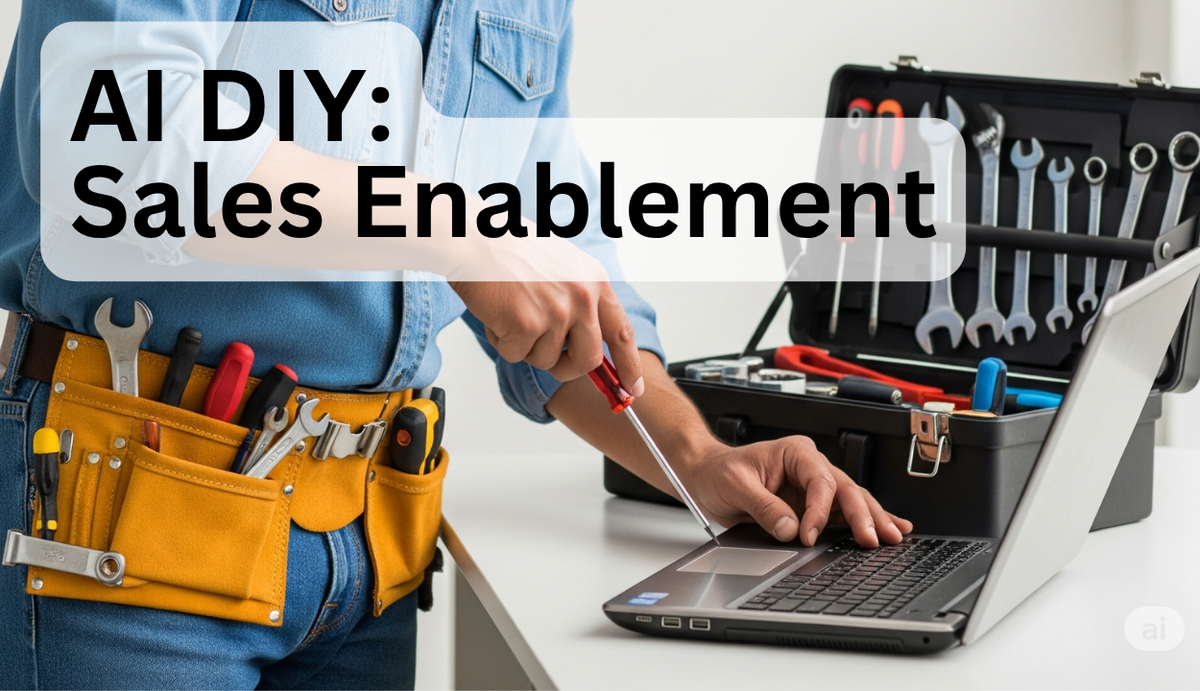AI DIY: Sales Enablement Use Cases for SMB Marketers
Many articles list the use cases for AI in marketing. Let's go deeper. Here's a behind the scenes look at three use cases in a small business.

If you're a marketer at a small business, you're likely a do-it-yourself expert, juggling multiple roles while working with a lean team and a lean budget. Chances are, you've already experimented with generative AI tools to support your communications. In this post, I'll share how I’ve been using AI to build marketing tools for others that streamline workflows and improve results.
This is the first in a series of AI DIY posts focused on implementing real use cases, and the roadblocks I’ve hit, while integrating AI into my marketing workflows. First up: sales enablement.
Here are a three of the many sales-related projects in motion. None of these were turnkey. Each one took a little hacking and a lot of testing. But there’s no better way to understand these tools than by rolling up your sleeves and building something yourself.
Lead Probability-to-Close Agent
It’s easy to get starry-eyed over large new client opportunities. But size doesn’t always equal sales. I wanted a tool that provide data-driven way to assess a lead, one that looked at actual patterns from our own lead and sales history.
What I did:
- Pulled a year’s worth of Deals from HubSpot. We document very detailed notes during every inbound lead call, often including observations about tone, needs, and urgency. This dataset was a goldmine.
- Uploaded the dataset into ChatGPT to explore the characteristics of leads that closed, and those that didn’t. Then I started asking deeper questions: Do certain phrases correlate with a win? Does the time of day matter? What does the caller’s tones reveal about intent?
- Uncovered patterns. Some were expected, but others were surprising, like how people expressed their needs, the emotional tone of the call, the gender of the client, and even the day and time the inquiry came in.
- Validated the results across Claude and Gemini to confirm I wasn’t overlooking anything critical. The findings were consistent, giving me confidence in the patterns and in the numerical weightings.
- Built a scoring agent using CustomGPT.ai. I translated the insights into scoring rules. Now when a new lead comes in, I copy the call details from the alert email and paste them into the agent. It returns a numerical score (0–100), a brief rationale for the score, and follow-up recommendations customized to the lead, with follow-up recommendations.
- Why it matters: HubSpot can’t calculate lead scores at the Deal level (Contact and Company level only), and its scoring is limited to keyword-based rules. My CustomGPT.ai agent provides a score with contextual evaluation and a relevant recommendation.
“Ask Marketing” Agent
We’ve been banging the drum on AI tools for some time, so everyone across sales is using ChatGPT for their emails and communications. But the results ChatGPT returns on our brand are often generic. In sales, precise language and nuance matters. I wanted to create an internal agent that every team member could use to generate brand-accurate, up-to-date, client-ready content in seconds.
What I did:
- Consolidated our sales library. Over the years, I’ve created an extensive archive of brochures, decks, personas, one-pagers, region-specific promos, testimonials, and more. Because of our account-based approach, we also had many custom variations.
- Merged content into knowledge documents. Custom GPTs cap you at 20 documents, so I restructured our materials into a small number of comprehensive, logically organized knowledge files. This made the content more usable and searchable.
- Wrote detailed agent instructions. I didn’t just upload the files, I explained the purpose of each section, when it should be used, and for which audience. When it comes to brand, hallucinations are unacceptable.
- Tried sharing the custom GPT… but hit limitations. Custom ChatGPTs often don’t retain the uploaded documents when shared, and users ended up with generic answers even when mine were accurate. That completely defeats the purpose of this. I even tried hosting the knowledge files in Google Drive and linking to them in the instructions, but it didn’t work reliably.
- Rebuilt the agent in CustomGPT.ai. I rebuilt the agent on CustomGPT.ai which allowed me to upload my structured knowledge files with the same instructions. It returned reliable results every time. And it gave me a branded interface that I embedded on our company intranet so the sales team can access it easily.
Now anyone on the team can use prompts like:
“Write a one-paragraph follow-up email to a residence director at a new community in <location>. Emphasize our unique advantages for this type of partner, include a client quote, and tie it to what we know about their pain points.”
On-brand, relevant, tailored to the opportunity... every time.
Website Lead Gen and Recruiting Agent
With our brand knowledge already structured, creating a client-facing version for our website was the natural next step. For many prospective clients and caregiver job seekers, the site is the first moment of truth. I wanted it to feel as helpful and human as our team.
What I did:
- Repurposed the internal knowledge doc, rewriting the language to suit a public audience. I stripped out sales jargon and reframed features as clear, benefit-driven messages.
- Uploaded a document with client reviews. This included dozens of testimonials and reviews from current and former clients. It adds authenticity to responses, so when a visitor asks, “What do your clients say about your responsiveness?”, they can see what clients think.
- Added a careers knowledge file outlining our culture, hiring process, roles, benefits, and interview tips. Caregivers often browse job options at night or on weekends, this agent makes that information available 24/7, in a format that works well on mobile devices.
- Customized the interface and embedded it on our WordPress site using CustomGPT.ai’s embed code. I matched our branding and added a warm, welcoming prompt.
- Monitored user intent. Reporting provides visibility into what people are actually looking for on our site. This has given me new insight into visitor behavior and content gaps, which I now use to improve the knowledge document.
Visitors now get rich, branded responses tailored to their questions,without having to search through pages or FAQs. It removes friction from both the lead gen and job application processes.





